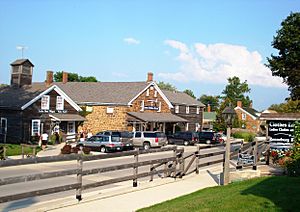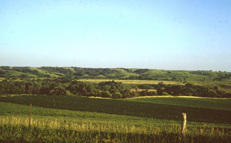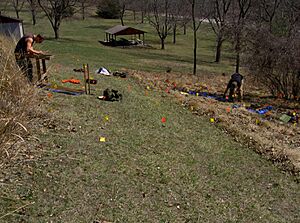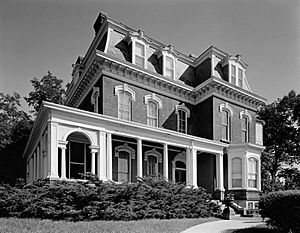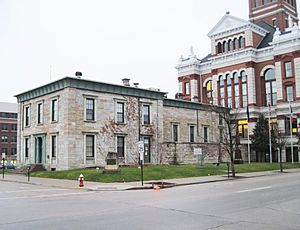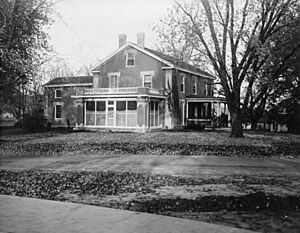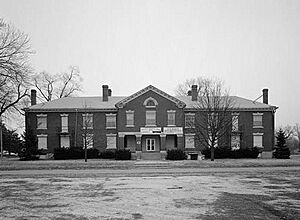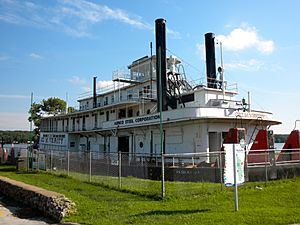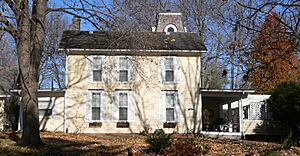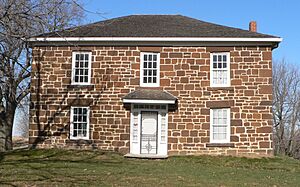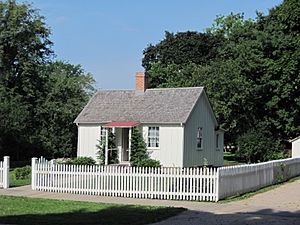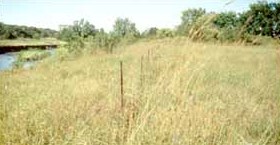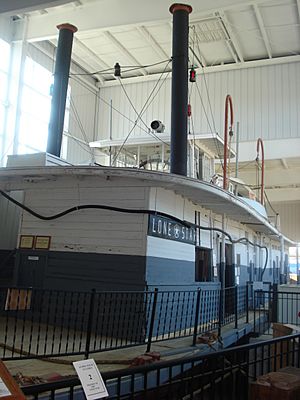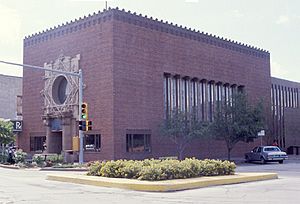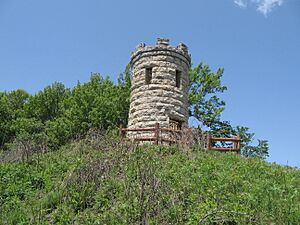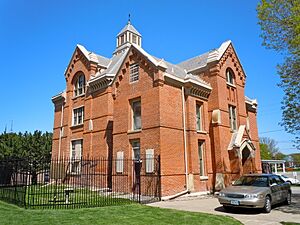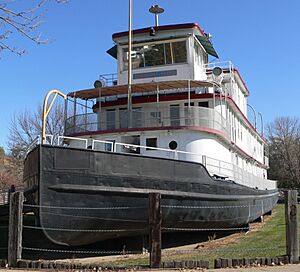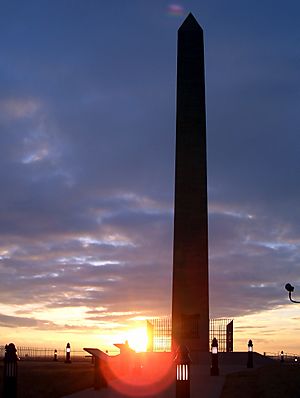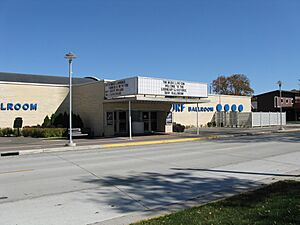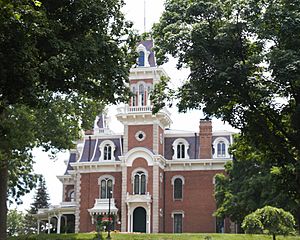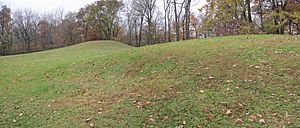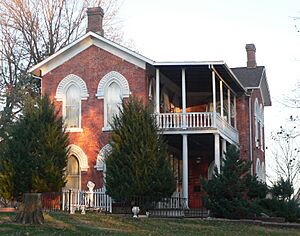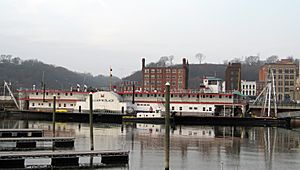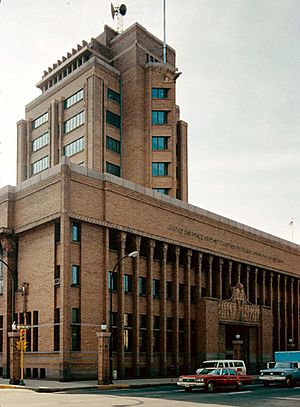List of National Historic Landmarks in Iowa facts for kids
The List of National Historic Landmarks in Iowa tells us about special places in the state of Iowa that the U.S. Federal Government has chosen as important. These places are called National Historic Landmarks (NHLs).
Iowa has 28 of these amazing landmarks! They are like treasures that help us remember important parts of American history and culture.
Contents
- What are National Historic Landmarks?
- Iowa's Special Places
- Amana Colonies
- Blood Run Site
- Davis Oriole Earthlodge Site
- Grenville M. Dodge House
- Dubuque County Jail
- The Farm House (Knapp–Wilson House)
- Fort Des Moines Provisional Army Officer Training School
- George M. Verity (towboat)
- William P. Hepburn House
- Reverend George B. Hitchcock House
- Herbert Hoover National Historic Site
- Indian Village Site (Witrock Area)
- Kimball Village Site
- Lone Star (towboat)
- Merchants' National Bank
- Julien Dubuque's Mines
- Old Capitol
- Phipps Site
- Pottawattamie County Jail and Sheriff’s Residence
- Sergeant Floyd (towboat)
- Sergeant Floyd Monument
- Surf Ballroom
- Terrace Hill
- Toolesboro Mound Group
- Van Allen Building
- James B. Weaver House
- William M. Black (dredge)
- Woodbury County Courthouse
- Other Important Iowa Sites
- See also
What are National Historic Landmarks?
National Historic Landmarks are buildings, sites, structures, objects, or districts that are officially recognized by the United States government for their outstanding historical importance. Think of them as super important historical sites!
- National Historic Landmark (NHL): A single building, site, or object.
- National Historic Landmark District (NHLD): An area with many buildings or sites that are important together.
- National Historic Site (NHS): A place managed by the National Park Service because it's historically important.
Iowa's Special Places
Amana Colonies
The Amana Colonies are a group of seven villages in Iowa County. They were founded by a religious group in the mid-1800s. People here lived a simple life, sharing everything. Today, you can still see their historic buildings and learn about their unique way of life.
Blood Run Site
The Blood Run Site is a very old archaeological site that stretches across parts of Lyon County, Iowa and Lincoln County, South Dakota. It shows us where Native American people lived long ago. Scientists study this site to learn about their history and culture.
Davis Oriole Earthlodge Site
Near Glenwood, the Davis Oriole Earthlodge Site is another important archaeological site. It has well-preserved remains of Plains Indians lodges, which were homes built partly underground. It's a great place to imagine how people lived centuries ago.
Grenville M. Dodge House
The Grenville M. Dodge House is in Council Bluffs. This was the home of Grenville Dodge, a famous Civil War General. He was also the Chief Engineer for the Union Pacific Railroad, which built the first transcontinental railroad!
Dubuque County Jail
The Dubuque County Jail in Dubuque is special because of its unique design. It's built in the Egyptian Revival style, which is very rare for a jail. It looks a bit like an ancient Egyptian temple!
The Farm House (Knapp–Wilson House)
Located on the Iowa State University campus in Ames, The Farm House was once home to important people in agriculture. These included Seagram A. Knapp, a teacher, and James Wilson, who became the U.S. Secretary of Agriculture.
Fort Des Moines Provisional Army Officer Training School
This historic site in Des Moines was a very important training ground during World War I. It was where the first African American officers in the U.S. Army were trained. It played a big role in the history of civil rights.
George M. Verity (towboat)
The George M. Verity is a historic towboat located in Keokuk. It's one of only three steam-powered towboats left in the United States. This boat helped change how goods were moved on the Mississippi River.
William P. Hepburn House
The William P. Hepburn House in Clarinda was the home of William B. Hepburn. He was a Congressman who served for many years. His work helped shape laws in the late 1800s and early 1900s.
Reverend George B. Hitchcock House
The Reverend George B. Hitchcock House in Lewis has a secret history! It was used as a "station" on the Underground Railroad. This was a network of safe houses that helped enslaved people escape to freedom before the Civil War.
Herbert Hoover National Historic Site
In West Branch, you can visit the Herbert Hoover National Historic Site. This is where Herbert Hoover, who became the 31st U.S. President, was born in a small two-room cottage. It's a great place to learn about his early life.
Indian Village Site (Witrock Area)
The Indian Village Site (Witrock Area) near Sutherland is another important archaeological site. It helps us understand the ancient cultures and communities that lived in Iowa long ago.
Kimball Village Site
The Kimball Village Site is located near Westfield. This site is from the Late Prehistoric Plains Village period. It provides clues about how Native American villages were organized and what life was like before European settlers arrived.
Lone Star (towboat)
The Lone Star is a very old towboat docked in LeClaire. It's the oldest of the three surviving steam-powered towboats in the U.S. It shows us how important these boats were for river transportation.
Merchants' National Bank
The Merchants' National Bank building in Grinnell is famous for its architecture. It was designed by the well-known architect Louis Sullivan. It's a beautiful example of his unique style.
Julien Dubuque's Mines
The Julien Dubuque's Mines in Dubuque is a historic area. It includes the Julien Dubuque Monument and old mining sites. This area tells the story of early lead mining in Iowa and the life of Julien Dubuque, an early settler.
Old Capitol
The Old Capitol in Iowa City was once the state's capitol building. It's a very grand and important building on the University of Iowa campus. It's part of a group of five historic buildings called the Pentacrest.
Phipps Site
The Phipps Site near Cherokee is an archaeological site. It helps experts learn about ancient cultures and how people lived in this part of Iowa many years ago.
Pottawattamie County Jail and Sheriff’s Residence
The Pottawattamie County Jail in Council Bluffs is special because it's one of the few remaining rotary jails. These jails had cells that could rotate, which was a unique design for their time.
Sergeant Floyd (towboat)
The Sergeant Floyd is another historic steam-powered towboat, located in Sioux City. Like the George M. Verity and Lone Star, it's one of only three left. It shows the history of river transportation.
Sergeant Floyd Monument
Also in Sioux City, the Sergeant Floyd Monument honors Sergeant Charles Floyd. He was the only member of the famous Lewis and Clark Expedition to die during their journey across America. This monument was the very first National Historic Landmark in the United States!
Surf Ballroom
The Surf Ballroom in Clear Lake is a famous music venue. It's known as a Historic Rock and Roll Landmark. Tragically, it was the last place where music legends Buddy Holly, Ritchie Valens, and J. P. "The Big Bopper" Richardson performed before they died in a plane crash in 1959. This event is often called "The Day the Music Died."
Terrace Hill
Terrace Hill in Des Moines is a beautiful mansion. It serves as the official residence of Iowa's Governor. It sits on a hilltop and is a grand example of historic architecture.
Toolesboro Mound Group
The Toolesboro Mound Group in Toolesboro is a site with ancient Native American mounds. These mounds were built by early peoples for burials and ceremonies. They are important for understanding ancient cultures in Iowa.
Van Allen Building
The Van Allen Building in Clinton is another building designed by the famous architect Louis Sullivan. It's a four-story building that used to be a department store. Today, it has apartments and shops.
James B. Weaver House
The James B. Weaver House in Bloomfield was the home of James Weaver. He was a Congressman and even ran for president! His home helps us remember his important role in American politics.
William M. Black (dredge)
The William M. Black is a sidewheel dredge located in Dubuque. It was operated by the U.S. Army Corps of Engineers. Dredges are special boats that help keep rivers deep enough for other boats to travel.
Woodbury County Courthouse
The Woodbury County Courthouse in Sioux City is considered one of the best examples of Prairie School architecture in the United States. This style of architecture is known for its strong horizontal lines and connection to the landscape.
Other Important Iowa Sites
Former Iowa NHLs
Sometimes, a landmark might move or change, and no longer be on the list for a certain state. For example, the President (steamboat) was once in Davenport, but it moved to other states later.
National Park Service Areas in Iowa
Besides National Historic Landmarks, Iowa also has areas managed by the National Park Service. These include:
- Effigy Mounds National Monument: A place with ancient Native American earth mounds shaped like animals.
- Herbert Hoover National Historic Site: (This is also an NHL, as mentioned above!)
See also
 | William L. Dawson |
 | W. E. B. Du Bois |
 | Harry Belafonte |


